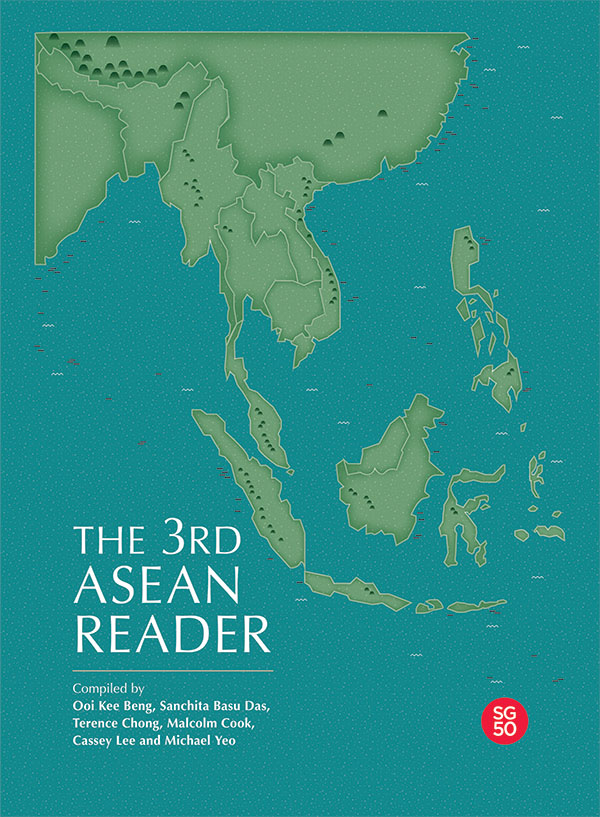Book contents
- Frontmatter
- Contents
- Preface
- Forewords to the First and Second ASEAN Reader: ASEAN: Conception and Evolution
- Forewords to the First and Second ASEAN Reader: ASEAN: The Way Ahead
- Forewords to the First and Second ASEAN Reader: New Challenges for ASEAN
- SECTION I ASEAN: THE LONG VIEW
- SECTION II COUNTRY ANALYSES
- SECTION III COMPARATIVE ANALYSES OF THE REGION
- Southeast Asian Societies
- The Southeast Asian Economy
- Southeast Asian Politics
- SECTION IV INTERNATIONAL DEVELOPMENTS
- SECTION V INSTITUTIONS OF ASEAN
- SECTION VI ASSESSING ASEAN'S INTERNAL POLICIES
- ASEAN Political Security Community
- ASEAN Economic Community
- ASEAN Socio-Cultural Community
- SECTION VII ASSESSING ASEAN'S EXTERNAL INITIATIVES
- ASEAN Processes
- 61 Driving East Asian Regionalism: The Reconstruction of ASEAN's Identity
- 62 Pakistan, SAARC and ASEAN Relations
- 63 Neither Skepticism nor Romanticism: The ASEAN Regional Forum as a Solution for the Asia-Pacific Assurance Game
- 64 ASEAN Plus Three and the Rise of Reactionary Regionalism
- 65 How the East Asia Summit Can Achieve its Potential
- 66 ‘Talking Their Walk’? The Evolution of Defense Regionalism in Southeast Asia
- 67 ASEAN FTAs: State of Play and Outlook for ASEAN's Regional and Global Integration
- 68 Taking ASEAN+1 FTAs Towards the RCEP
- 69 RCEP and TPP: Comparisons and Concerns
- 70 Enhancing the Effectiveness of CMIM and AMRO: Selected Immediate Challenges and Tasks
- ASEAN's Major Power Relations
- SECTION VIII SOUTHEAST ASIA: PERIPHERAL NO MORE
- Bibliography
- The Contributors
- The Compilers
64 - ASEAN Plus Three and the Rise of Reactionary Regionalism
from ASEAN Processes
Published online by Cambridge University Press: 22 June 2017
- Frontmatter
- Contents
- Preface
- Forewords to the First and Second ASEAN Reader: ASEAN: Conception and Evolution
- Forewords to the First and Second ASEAN Reader: ASEAN: The Way Ahead
- Forewords to the First and Second ASEAN Reader: New Challenges for ASEAN
- SECTION I ASEAN: THE LONG VIEW
- SECTION II COUNTRY ANALYSES
- SECTION III COMPARATIVE ANALYSES OF THE REGION
- Southeast Asian Societies
- The Southeast Asian Economy
- Southeast Asian Politics
- SECTION IV INTERNATIONAL DEVELOPMENTS
- SECTION V INSTITUTIONS OF ASEAN
- SECTION VI ASSESSING ASEAN'S INTERNAL POLICIES
- ASEAN Political Security Community
- ASEAN Economic Community
- ASEAN Socio-Cultural Community
- SECTION VII ASSESSING ASEAN'S EXTERNAL INITIATIVES
- ASEAN Processes
- 61 Driving East Asian Regionalism: The Reconstruction of ASEAN's Identity
- 62 Pakistan, SAARC and ASEAN Relations
- 63 Neither Skepticism nor Romanticism: The ASEAN Regional Forum as a Solution for the Asia-Pacific Assurance Game
- 64 ASEAN Plus Three and the Rise of Reactionary Regionalism
- 65 How the East Asia Summit Can Achieve its Potential
- 66 ‘Talking Their Walk’? The Evolution of Defense Regionalism in Southeast Asia
- 67 ASEAN FTAs: State of Play and Outlook for ASEAN's Regional and Global Integration
- 68 Taking ASEAN+1 FTAs Towards the RCEP
- 69 RCEP and TPP: Comparisons and Concerns
- 70 Enhancing the Effectiveness of CMIM and AMRO: Selected Immediate Challenges and Tasks
- ASEAN's Major Power Relations
- SECTION VIII SOUTHEAST ASIA: PERIPHERAL NO MORE
- Bibliography
- The Contributors
- The Compilers
Summary
ASEAN PLUS THREE: ITS ANTECEDENTS AND PROSPECTS
In this section I examine the forces that have encouraged the development of the nascent ASEAN Plus Three grouping, which includes the much larger economies of Japan, China and South Korea in addition to the ten ASEAN members. The picture that emerges is complex, uncertain and rapidly evolving, but one tentative conclusion appears plausible: formerly quiescent strategic considerations, the absence of which allowed a greater degree of autonomy to develop within East Asia, have resurfaced and look set to play an important role in shaping and delimiting the possible trajectory of East Asian regionalism. A further caveat needs to be added to this claim: the impact of strategic considerations is itself potentially contradictory and will ultimately depend on a number of imponderable strategic developments — especially those revolving around American foreign policy — and the region's capacity to develop collective responses to them. At this stage, all we can do is spell out some of the potential contradictory dynamics that are likely to underpin future developments and link them to the region's specific historical circumstances.
Regional Factors
The most important antecedent of ASEAN Plus Three is, of course, ASEAN itself. Although ASEAN has provided an important foundation for the development of a wider East Asian grouping, there are some important differences in the formative dynamics of both groupings that merit brief emphasis. ASEAN, as noted earlier, was very much a product of the aftermath of the decolonization process, the Cold War, and the great power contestation that continues to grip the region. Regionalization — or the private sector-driven economic integration manifest in denser trade and investment flows — was not a decisive force in encouraging closer political co-operation in Southeast Asia. On the contrary, intra-regional trade is still modest between the non-complementary and essentially competitive economies in most of ASEAN. It is important to remember that ASEAN is composed of a number of small economies, the structure and development of which have been profoundly shaped by colonialism and latterly by the activities of more powerful economic and political forces from outside Southeast Asia. In other words, there have been integrative forces encouraging economic regionalization, but these have emanated from countries like Japan, which are outside the smaller ASEAN grouping and are an expression of wider East Asian forces.
- Type
- Chapter
- Information
- The 3rd ASEAN Reader , pp. 337 - 341Publisher: ISEAS–Yusof Ishak InstitutePrint publication year: 2015



